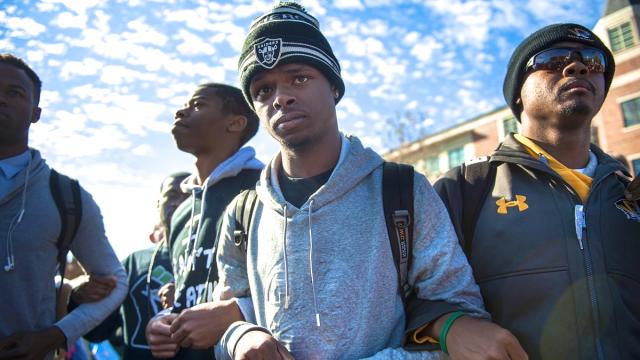
Critiques of the anti-racism student protesters and their demand that universities actively address systemic racism in higher education have been both frequent and swift. What could have been – and might yet still be – a valuable opportunity to discuss and begin to address a very real issue has been commandeered by those who would frame the conversation as one in which protesters are accused of trying to limit the free speech of their peers.
These first amendment enthusiasts are either unaware or unconcerned with the persistent racial inequality that prevents students of color from even accessing this right in the first place. And yet, critics would rather focus on an imagined denial of rights to the dominant group, instead of the legitimate and persistent denial of rights to the oppressed.
When the newly formed Black Liberation Collective asked students around the U.S. to present their universities with a set of radical demands, including the provision of free tuition for black and indigenous students as well as divestment from prisons on Wednesday, protesters were accused of trying to limit the free speech of those who did not agree with their mission.
Using the first amendment to silence an oppressed underclass is not a new tactic, and it’s one that conveniently ignores the inescapable imbalance of power created by white supremacy, which necessitates the criminalization of all affronts to its authority while deepening the oppression of others.
It is white supremacy that allows critics to defend the racist’s right to free speech while simultaneously denying the oppressed the right to respond. The very trivialization of concerns raised by students of color as nothing more than a hypersensitve over-reaction is itself a form of censure. The result is a prioritization of abstraction over psychological or even physical violence and the demonization of victims.
The protesters with whom I have spoken hold no desire to censure their peers. They are aware of what the first amendment entails and resent the condescension of those who imply that they do not fully understand the implication of their actions. Contrary to what critics might believe, it is not silence which students seek, but dialogue; not a restriction of rights, but an expansion. The problem then, is not that these rights are being extended, but to whom they are being extended.
Students of color in the age of #BlackLivesMatter understand the vital importance of being able to tell one’s own story. They have watched the truths of their mothers, grandmothers, relatives and ancestors become twisted or silenced. They have fought hard for the right to tell their stories and to feel safe in doing so.
Yet these activists, who might be considered freedom fighters if not for the color of their skin, have been met with the hostile accusation that they are illegitimate in laying claim to their rights. Even beyond this, the mere fact that a conversation intended to be centered on black students and anti-racism efforts has been derailed and reduced into a conversation about whiteness and its imagined loss of power is itself a silencing tactic.
In the face of persistent interpersonal and institutional racism, black students and those who support them have demanded that their experiences and their very humanity be recognized and valued in concrete ways. They have rejected the tactic of apathetic silence followed by lukewarm apologies that has often been used by university administrations across the country.
They resist the false critique that an expansion of their rights is inherently an attack on the rights of their peers. They loudly proclaim that black lives and black minds matter and are deserving of protection from those that would seek to enact violence upon them.
3 WAYS TO SHOW YOUR SUPPORT
- Log in to post comments











